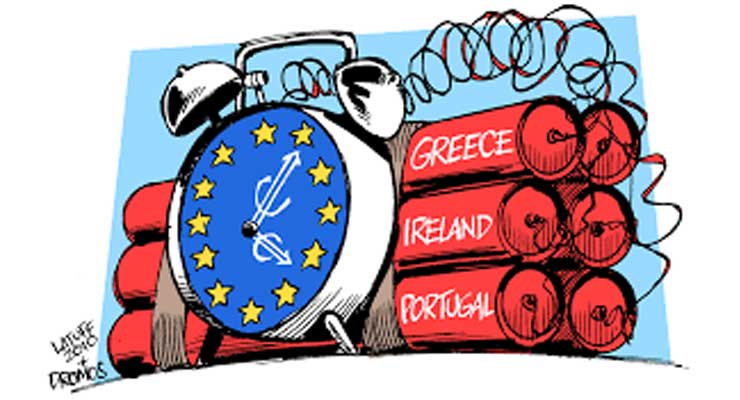
Speaking at a press conference this previous Friday, Euro Zone Finance Minister Jeroen Dijsselbloem and other finance leaders, issued a new warning about a potential future economic crisis which could affect the EU and the major G20 economies. “The danger of a new crisis has not completely vanished”, German Finance Minister Wolfgang Schaueble said of the possible upcoming crisis. Numerous crises have been affecting economies around the world over the past 6 years, many of which have been associated with the EU and many undeveloped countries around the world.
Some issues that threaten the world’s economies include the EU debt crisis, particularly, the Greek Debt crisis, along with the nearly five-year-old Syrian Civil War (start date, March 15th, 2011), the refugee crisis that has been associated with it, and the general stagnation of the EU economies.
Much of the stagnation in the European Union has been caused by the debt that has been plaguing countries such as Greece, Portugal and Spain, all three of which have been part of the EU debt crisis. The debt crisis has raised questions about the very stability of the EU as fears of contagion spreading if Greece left the EU over debt than other countries would leave as well causing the collapse of the entire EU.
“Here is a financial institution which needs to be restructured and strengthened and needs to bring in new capital and we cannot then have an even bigger amount of capital being pulled out by the American authorities”, finance minister, Dijsselbloem said, regarding Deutsche bank. Deutsche bank has been fined by U.S authorities for its role in the sub-prime mortgage crisis.
Subprime mortgages played a critical role in the onset of the financial crisis as many home owners were allowed to buy houses they could not afford which led to a collapse of the housing market and the onset of a financial crisis in the United States.
The recession that hit the United States between 2007 to 2010 has become known as the “Great Recession.”
“We’ve also been clear that Europe has not done as much as the United States, and this is a case where sometimes doing more is better” Jack Lew said regarding the financial struggles of the U.S and the EU. Mr. Lew played a critical role in the Obama administration as the Director of Office of Management and Budget, during the height of the crisis.
The fine for Deutsche Bank is $14 billion, a total which German official hope could be reduced.
“Let’s hope it’s an opening bid” Mr. Dijsselbloem said during an interview. “These kids of fines are completely oversized and they are damaging to financial stability.”
Another critical issue affecting the world economy which has not been brought up on a regular basis is the $19 trillion in debt that the United States owes to creditors. This could start weighing down the economy as politicians start to think of ways on how to cut back on spending and raise taxes to compensate for the tremendously high debt brought upon the country by both parties.
Much of the debt is owed to China and fears are that they could use that as leverage in certain issues affecting the pacific region.
The wars in Iraq and Afghanistan along with other programs by the Bush and Obama administrations have helped spike up the debt and deficit over the past 10 years.
An issue that has been haunting the minds of financial leaders in addition to the prior stated concerns, is the Brexit and the crash in value of the British Pound as a direct effect of the referendum. In recent months, the Pound declined 10%, largely on fears of the uncertainty of the future of Britain.
“If the message remains the “hard Brexit”, if that is really the way he British government wants to proceed, you can’t be surprised that the pound will go down. I think that is happening”, Mr. Dijsselbloem continued in the interview.
British officials have made efforts to speed up their plan to exit the EU.
Part of the uncertainty is that Britain would not have the same benefits in trade and economic policies as it has now as part of the EU, and would ultimately have to come up with new policies.
The crash in the Pound’s value is known as a “Flash Crash.”
In summary, major world economies should come up with a plan to stabilize the developed economies first and then shift their attention to coming up with policies that would be able to promote economic growth and health along with state sovereignty.
Links to sources:
- Reuters Link: https://www.reuters.com/article/us-imf-g-idUSKCN1271LV
- Subprime Mortgage Definition: https://www.federalreservehistory.org/Events/DetailView/55
- USA Debt Clock Real Time: https://www.usdebtclock.org/
Leave a Reply